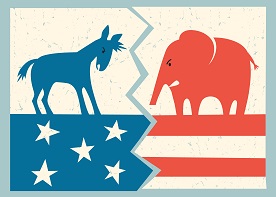
A newly published study conducted by CSAP affiliates Greg Huber and Lilla Orr explores the reasons why Republicans and Democrats express negative feelings toward one another. The study draws on a series of survey experiments to argue that instead of blind loathing, contentious policy debates are a key force driving interpersonal hostility between U.S. partisans. Their article, “The Policy Basis of Measured Partisan Animosity in the United States,” appears in the American Journal of Political Science (AJPS). Read more at YaleNews.
Abstract: Understanding and addressing the consequences of partisan animosity requires knowledge of its foundations. To what extent is animosity between partisan groups motivated by dislike for partisan outgroups per se, policy disagreement, or other social group conflicts? In many circumstances, including extant experimental research, these patterns are observationally equivalent. In a series of vignette evaluation experiments, we estimate effects of shared partisanship when additional information is or is not present, and we benchmark these effects against shared policy preference effects. Partisanship effects are about 71% as large as shared policy preference effects when each is presented in isolation. When an independently randomized party and policy position are presented together, partisanship effects decrease substantially, by about 52%, whereas policy effects remain large, decreasing by about 10%. These results suggest that common measures of partisan animosity may capture programmatic conflict more so than social identity-based partisan hostility.
